A.J. Soprano is the archetypal failson. Dead-eyed and unable to commit to anything, he’s coddled from the cruelty of the world by his well-off parents. He’s haunted by the hypocrisy of his family and the world he was born into, but cannot bring himself to do anything about it. As he grows up, A.J. wants to make something of his life that he can derive meaning from and feel proud of, but doing so would mean abandoning all the luxuries, privileges, and commodities that his family’s lifestyle affords him — and worst of all — having to keep that shitty Blockbuster job and stay in school.
A.J. reminds me of a lot of young people I know. His father, Tony Soprano, idealizes older generations and is angry that he came in at “the end” of the glory days of organized crime, the American Empire, and masculinity as he knows it. A.J. Soprano came in after “the end of history” — all he got was nu-metal and an attention-deficit disorder diagnosis.
Existential angst, familial resentment, and the corrupt politics of the aughts all eat away at A.J.; he ends up locked into what Mark Fisher called “the comfort food oblivion of PlayStation, all-night T.V., and marijuana.” He’s given up. The best lack all conviction, while the worst are full of passionate intensity.
The first time I watched Tony walk into A.J.’s room and grimace at his half-naked son giggling at his computer, I felt a deep kinship with A.J. As he got older and drifted aimlessly from job to job and fumbled girl after girl, all while getting into edgy politics and Bob Dylan, I felt a little too called out. While I didn’t grow up anywhere close to as rich as him, every pathetic “A.J. moment” only further endeared him to me and reminded me of my own adolescence.
Not everyone shares my appreciation for him. In a show filled with murderers, thugs, and rapists, a lot of the audience's hate seems to be reserved for the pathetic and indolent sixteen-year-old boy. Why is this? Could the older Sopranos fans see too much of their annoying kids in him? Does he hit a little too close to home for younger viewers? This may be the case. After all, does anyone really want to admit that they are (or were) like A.J.? As a young man, it's easy to romanticize yourself as a Tony or a Christopher. It's a hell of a lot harder to admit that you're just A.J.
In September 2021, The New York Times published an article asking, "Why Is Every Young Person in America Watching 'The Sopranos'?" In this piece, Willy Staley echoes the Chapo Trap House argument that The Sopranos is a show about American decline, a theme that's only become more compelling in the twenty-five years since the show premiered. A new generation of young leftists are getting into The Sopranos, and thinking about it more than its original audience was willing to. As cliché as the "socialist Sopranos fan" may be, this isn't a bad thing — The Sopranos is the kind of show worth digging into.
And the oft-maligned character of A.J. Soprano is worth reconsidering. If young fans want to fully embrace The Sopranos, we must reckon with our portrayal in A.J. Soprano. This means going beyond lauding the show for its realistic depiction of panic attacks or calling out Tony Soprano's problematic behavior; it's time to tackle the hard parts. Young people prone to calling out the world for all its wrongs but reluctant to acknowledge our complicity and vices must come to see ourselves in A.J. Soprano and all his brooding, angsty, Bush-era left-ish, proto-online complexity.
In the New York Times piece linked above, Staley argues that young people have much more in common with Tony Soprano than we may assume, which is why his character continues to resonate with The Sopranos’ new audience. There’s no shortage of sad Tony (and Chrissy) TikTok edits set to The Smiths or Radiohead. We relate to Tony because he sees and despises the decline in the world and himself. Be that as it may, this new wave of Sopranos fans is far more A.J. than Tony.
A.J.’s condition should be familiar to anyone who has known a teenage boy in the twenty-first century. But he should hit especially close to home for those who have known someone handed everything in life except for the drive to do something with it. Staley writes that it’s a combination of privilege and self-loathing that makes Tony relatable, and I think it’s the same for his son; the two are a lot alike in some ways. A.J. knows how his family finances their lifestyle and how that benefits him, he knows how fucked the government is, he knows that his parents’ marriage is a sham, and he’s watching his sister end up just like the rest of his mobbed-up family. Part of him resents himself for not being cut out for the life his father leads, but another part resents his family for their obvious hypocrisy and moral failures. He’s caught up in all this throughout his adolescence and can’t pull himself away from it, because that would mean losing the bourgeois comforts and advantages he enjoys and having to make something of himself on his own. This is the deadly mixture of privilege and self-loathing that he inherited from his dad, and it’s the condition that plagues all failsons.
At the start of the show, A.J. is a chubby little rascal who likes Ziti and playing Mario Kart with his dad. In the final season, A.J. can’t find anything to keep him going in the world, and any likable qualities he once had have been drained from him. Throughout A.J.’s decline, he stumbles through every failson cliché in the book and invents some new ones along the way.
When A.J. reads Camus he uses it as an excuse to act like an asshole. He smokes weed when he shouldn’t and mispronounces Nietzsche in a way I didn’t even know was possible. He can’t focus on anything and has no idea what he wants to do with his life, or if he’s even capable of anything. Heeding his grandmother’s advice, A.J. doesn’t expect to be given any purpose in life. It’s all a big nothing.
When A.J. gets assigned People’s History of the United States he becomes woke, much to his parents’ chagrin. A.J. tries to cancel Christopher Colombus and complains that the new SUV his father bought him isn’t good for the environment. Woke A.J. becomes a based 2000s lib and starts posting on forums about Bush’s mishandling of the War on Terror. In spite of his newfound political beliefs, the ethics surrounding the production and exchange of cocaine don’t seem to bother him too much during his clubbing era.
A.J. has to leave a Starbucks when he won’t stop crying over his ex-girlfriend — the same girl whose name is tattooed on him. He accidentally lights his new car on fire cause he’s too distracted showing a pretty girl a seven-minute-long Bob Dylan song. He gets really into Yeats’ The Second Coming, then tries and fails to kill himself.
Does A.J. remind you of any young people you know?
It’s not hard to imagine what A.J. would be like if he were a zoomer like me, in fact, when he got his eyebrows shaved off, he reminded me a lot of some Montreal they / them’s I know. I get why Tony accused him of being into poppers and weird sex. If A.J. had been born fifteen years later, his nu-metal phase would have been a hype beast SoundCloud rap phase instead, and then he’d inevitably move onto indie music. His somewhat incoherent politics probably would have coalesced around the Bernie campaigns. I can definitely picture him listening to CumTown. But above all else, A.J. would definitely be the type of guy to be really into The Sopranos. I think a lot of fans implicitly recognize themselves now or when they were younger in the A.J. archetype, even if they’re a bit less embarrassing. And that’s okay.
As awful of a dad as he was, I can recall one good piece of fatherly advice from Tony. When A.J. goes through his breakup, he cries out that his life is over, but Tony tells him, “You’re twenty years old; you barely have a life”.
At the end of the series, we can infer what Meadow Soprano’s life will be like. In the finale, we learn that Meadow is going out with a mafia son and has taken a job with a mobbed-up law firm. Despite all the lip service she paid to social justice and defending marginalized communities, Meadow seemed to have a pretty easy time turning her back on all that. For better or for worse, she didn’t seem to struggle as much as A.J. did to make peace with the evils of her family and the world. She will probably end up like her mother. That isn’t the case with A.J. As much as we don’t know how he will end up, there’s no world where he turns into the next Tony Soprano. That’s worthy of celebration.
Take it from the creator David Chase. A.J. wasn’t meant to be the punching bag that fans turned him into. In a 2015 interview with Vice, he explained, “Almost everybody hates A.J. [laughs], and I have never understood it. He’s very relatable, a typical teenage kid. Obviously he’s not gonna be the valedictorian of his class, and he’s got some problems. When you say that his father was a murderer — of course he was. I never understood this disgust with A.J. I don’t know how he could have turned out any differently than he did. And he’s to be commended, and so are his parents, because it’s pretty obvious at the end of the show that A.J. is not gonna be a killer like his father, and not gonna be a thief and a liar. Maybe a liar. We all lie. But he’s not gonna be a thief, a bully, and a murderer. That’s progress.”
There’s a lot for the new, younger fans of The Sopranos to take away from this character if they don’t dismiss him out of hand. What is it to be a failson, if not to be all too cognizant of your own shortcomings and how you’ve been protected from the brutal reality of the world by your family, but without the backbone to take your life into your own hands? This isn’t a matter of “recognizing your privilege”. A.J. is well aware that he’s extraordinarily lucky. He’s in a much more difficult position now; he has to either live unfulfilled and tormented by his demons forever or abandon his safety net. A.J.’s only way out of failson-ry is to turn away from an easy life of working for Little Carmine’s porn studio, resenting but still comparing himself to his father, and getting fat off baked ziti. He’s got to grow up, he’s not a kid anymore.
Political principles and ideas of authenticity mean nothing if you do not live by them. A.J. can talk about Howard Zinn and complain about his dad all he wants, but that’s not worth anything if he doesn’t make something different of himself. One of the questions that the audience is left with in the finale is what path A.J. will follow. As Tony says, A.J.’s barely had a life, and it’s hard to say how he will end up. I’d like to believe there’s still hope for A.J. and the rest of the failsons of the world.




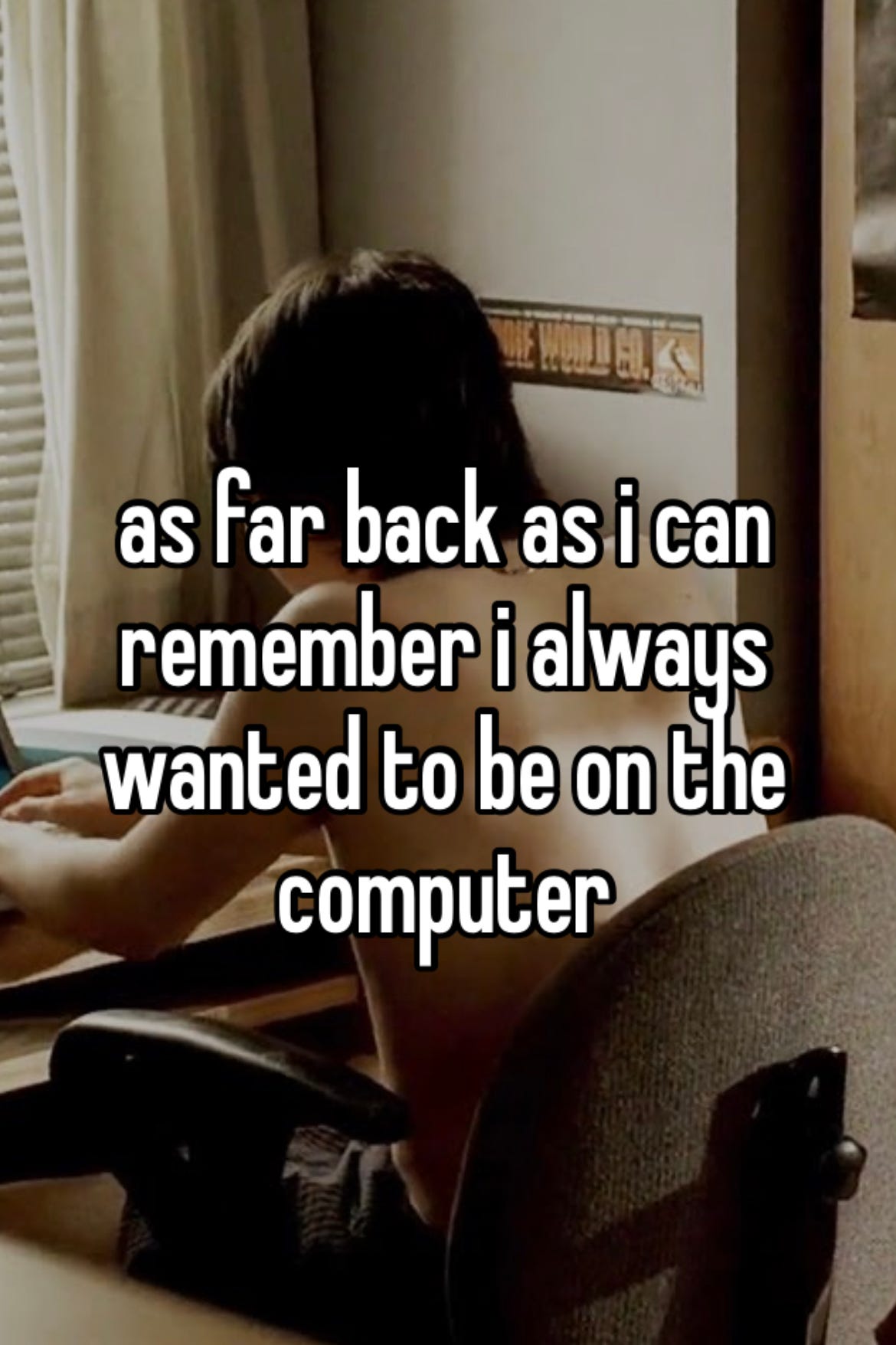
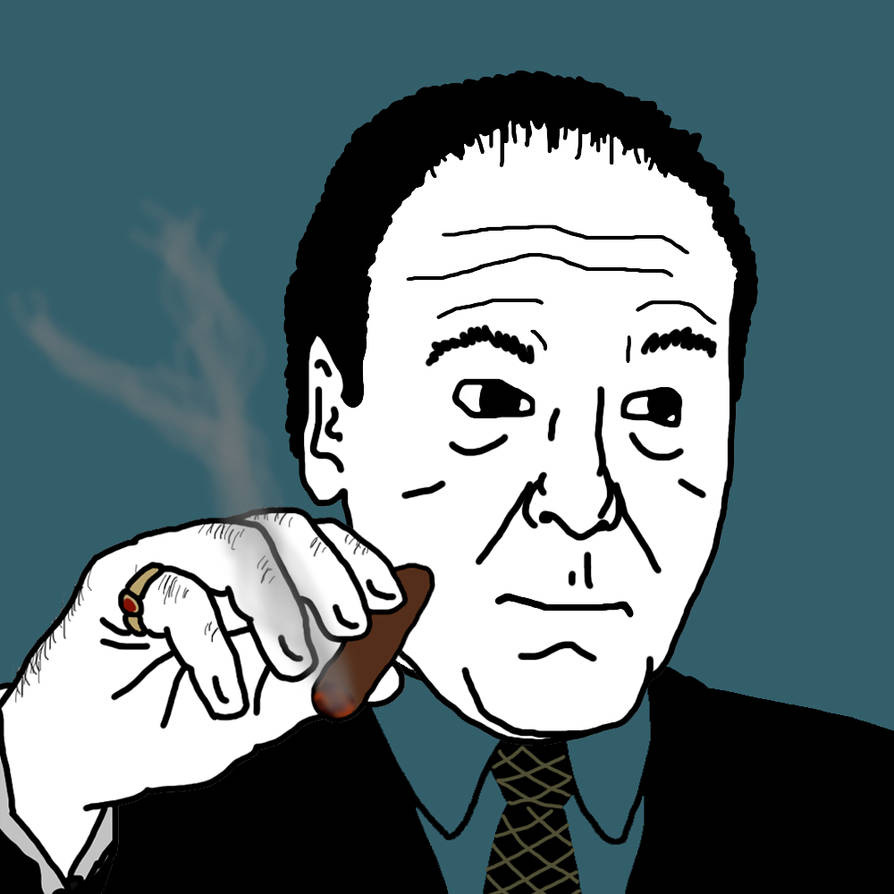

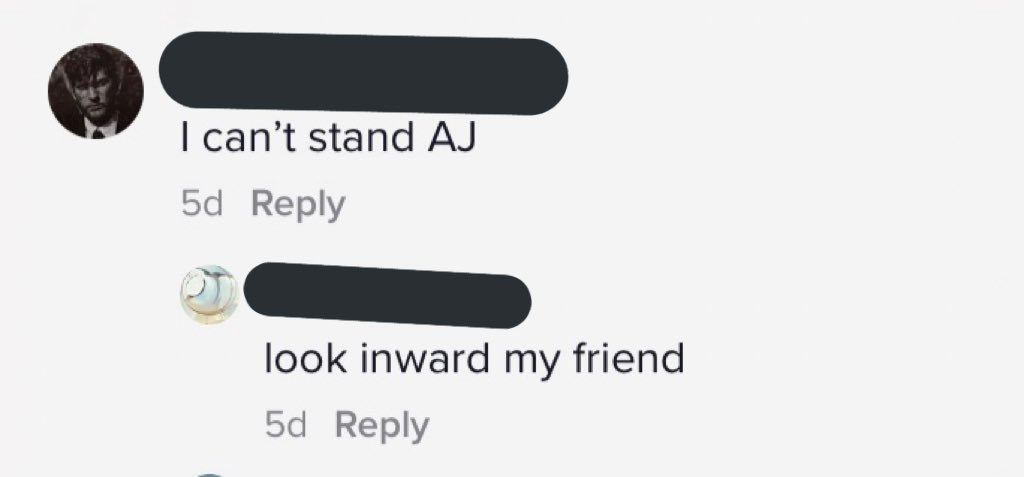
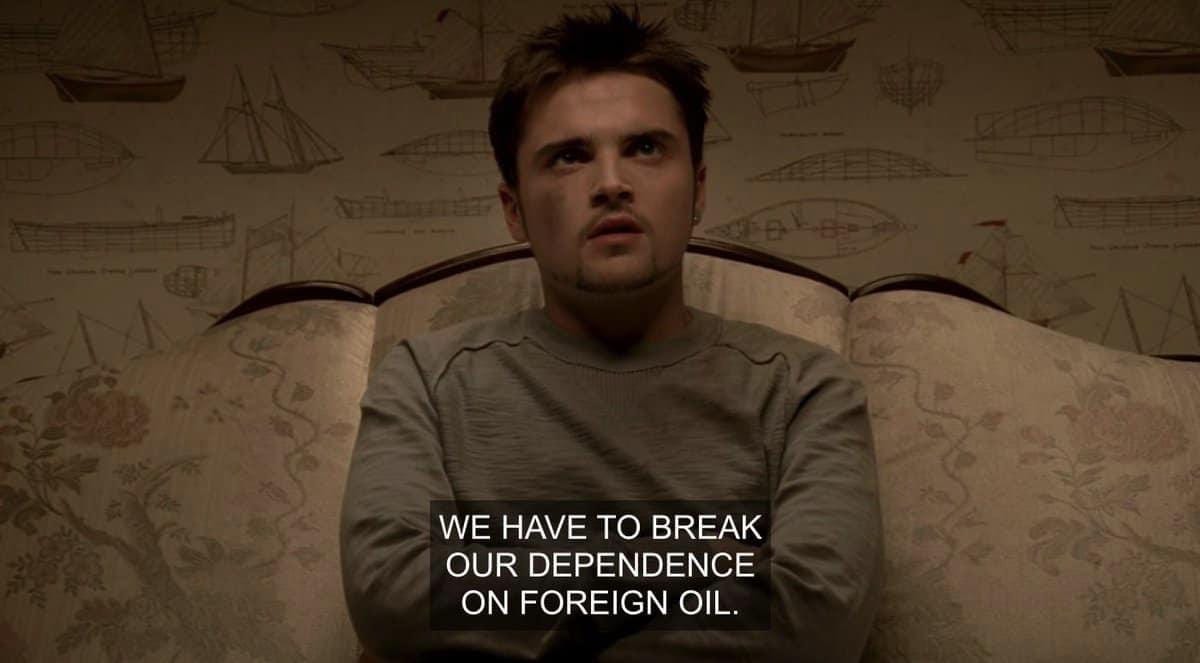
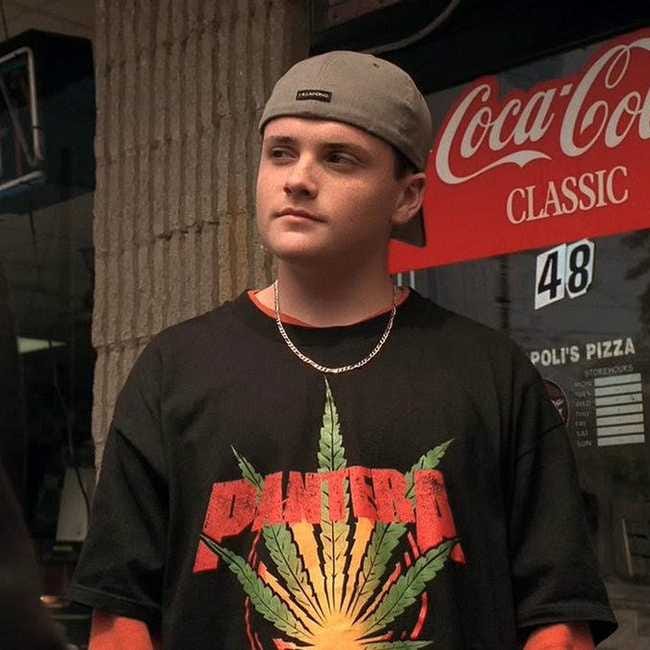
It’s been a couple years since I watch the sopranos and I forget the degree to which I disliked AJ. Totally forgot the heartwrenching pool scene. If I rewatch it I’ll be paying closer attention to AJ. Good piece here
This is incredible. Time to make an AJ Soprano edit